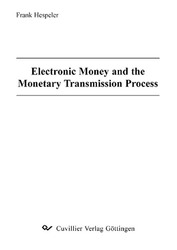| Departments | |
|---|---|
| Book Series (97) |
1381
|
| Nachhaltigkeit |
3
|
| Gesundheitswesen |
1
|
| Humanities |
2370
|
| Medienwissenschaften | 16 |
| Theology | 57 |
| Philosophy | 102 |
| Law | 423 |
| Economics | 852 |
| Social sciences | 417 |
| Sports science | 48 |
| Psychology | 233 |
| Educational science | 190 |
| History | 183 |
| Art | 111 |
| Cultural studies | 166 |
| Literary studies | 117 |
| Linguistics | 88 |
| Natural Sciences |
5408
|
| Engineering |
1796
|
| Common |
98
|
|
Leitlinien Unfallchirurgie
5. Auflage bestellen |
|
Advanced Search
Electronic Money and the Monetary Transmission Process (English shop)
Frank Hespeler (Author)Preview
Table of Contents, Datei (36 KB)
Extract, Datei (71 KB)
The emergence of new digital payment media has been of growing
importance in the last two decades. These new forms of payment
media rise the questions wether and how the monetary control of the
central bank is influenced. This book analysis the influence of electronic
money’s emergence on the monetary transmission process
which is the central element linking monetary policy and the real economy.
As economically most significant characteristics of electronic
money low transaction costs as well as low regulation costs are isolated.
As a consequence of these properties electronic money partially
substitutes for traditional payment media, but also the market volume
for payment media rises. A change in the allocation of the entire economy
follows. It turns out that electronic money does not impede the
central bank’s power to influence real economic activity. However it
changes the nature of the transmission process and forces the central
bank to react to changes in the relative importance of specific monetary
transmission channels. These results are generated by numerical
simulations of a version of today’s most common workhorse model
for monetary policy analysis: the dynamic new Keynesian general
equilibrium model.
| ISBN-13 (Printausgabe) | 3867277605 |
| ISBN-13 (Hard Copy) | 9783867277600 |
| ISBN-13 (eBook) | 9783736927605 |
| Final Book Format | A5 |
| Language | English |
| Page Number | 290 |
| Edition | 1 Aufl. |
| Volume | 0 |
| Publication Place | Göttingen |
| Place of Dissertation | TU Chemnitz |
| Publication Date | 2008-10-17 |
| General Categorization | Dissertation |
| Departments |
Economics
|








